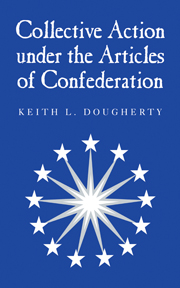Book contents
- Frontmatter
- Contents
- List of Tables and Figures
- Acknowledgments
- 1 The Mystery of State Contribution
- 2 National Interests and State Sovereignty: Objectives of the Confederation
- 3 Collective Action and the Provision of Public Goods
- 4 The History of State Compliance
- 5 State Contributions and Private Interests
- 6 Reacting to Rebellion
- 7 A New Constitution
- 8 Conclusion
- Appendix: Olson's Collective Action Game
- Glossary
- References
- Index
1 - The Mystery of State Contribution
Published online by Cambridge University Press: 15 October 2009
- Frontmatter
- Contents
- List of Tables and Figures
- Acknowledgments
- 1 The Mystery of State Contribution
- 2 National Interests and State Sovereignty: Objectives of the Confederation
- 3 Collective Action and the Provision of Public Goods
- 4 The History of State Compliance
- 5 State Contributions and Private Interests
- 6 Reacting to Rebellion
- 7 A New Constitution
- 8 Conclusion
- Appendix: Olson's Collective Action Game
- Glossary
- References
- Index
Summary
It is essential to the idea of a law, that it be attended with a sanction: or, in other words, a penalty or punishment for disobedience. If there can be no penalty annexed to disobedience, the resolutions or commands which pretend to be law will, in fact, amount to nothing more than advice or recommendation.
–Alexander HamiltonCongress faced a hidden enemy throughout the Revolutionary War. In addition to fighting the British, Congress struggled with its own inability to raise resources from the states. Without adequate men, money, and supplies from the states, members of Congress could not provide Continental troops. As John Sullivan observed in 1780, “they send Regulations to the States, some comply some do not; and the Consequence of this is too Obvious to need Explanation.” Some 10,000 American soldiers died in camp from starvation, wounds, or disease. Food and supplies were so scarce that a band of soldiers resorted to eating their dog near Lake Champlain; others at Valley Forge tried to gain sustenance from the soles of their boots. The problem of providing for the army and raising new recruits was so severe that as early as 1776 George Washington wrote, “I think the game is pretty near up.”
When the war ended, state support for the federal government declined to even lower levels.
- Type
- Chapter
- Information
- Publisher: Cambridge University PressPrint publication year: 2000



